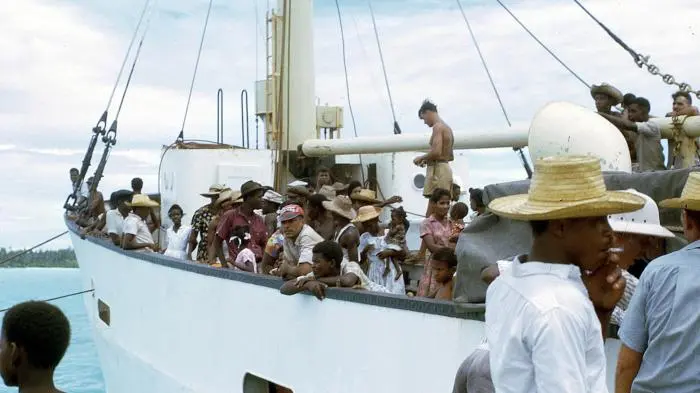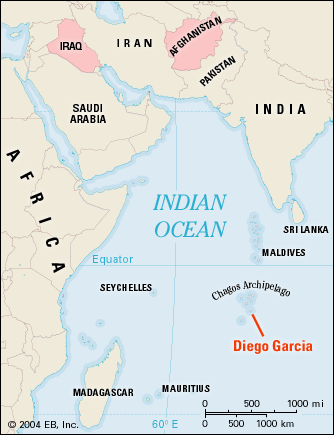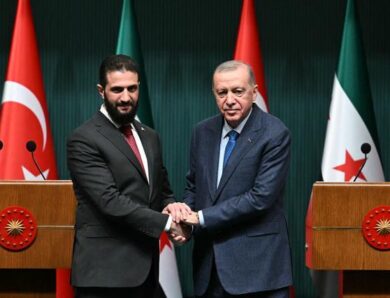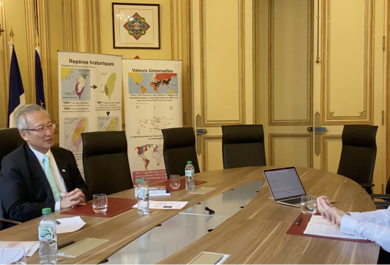
The sovereignty transfer of the Chagos Islands
By Esther DIEZ
Decades after the end of British control, the Chagos Islands were officially returned to Mauritius. While this resolution, particularly its legal dimensions, is experienced as a significant victory for Mauritius, it remains insufficient for the Chagossian people. They continue to seek justice for the human rights violations they endured, including the forced displacement from Diego Garcia, the largest island to which they are still unable to return.

Protesters, descendants of Chagossians living in the United Kingdom are demanding justice for human rights violations and the inability to return to the archipelago1
Introduction :
On October 3rd, the United Kingdom (UK) agreed to transfer sovereignty over the Chagos Islands to Mauritius after decades of negotiations, marking it a historic landmark. This treaty aims to resolve past wrongs, taking into account the colonial past and forced displacement of Chagossians in the region. However, the US-UK military base on Diego Garcia will remain operational for an “initial period of 99 years”.2
The UK promised financial support and resettlement plans for the Chagossians3, even though they will not have the possibility to return to Diego Garcia, but only to the six remaining atolls. This announcement is a direct response to rising international pressure on the UK, particularly from the United Nations (UN) and African nations, demanding that the British hand over sovereignty over their last colony in Africa.4
The timing of this agreement is connected to the shift in global dynamics, as the UK seeks to resolve this issue in a context of geopolitical tensions and a lack of broader international support post-Brexit. Indeed, the UK is struggling to redefine its new global role, as its intended “Global Britain” (term used by the Brussels Office) strategy faces challenges, including in its relations with the United States (US) and China. Therefore, one of the strategies consist of re-engaging with Europe for security as well as tackling issues revolving around colonial inheritage.5 Yet, there is a backlash within internal British politics, mainly from the most conservative parties, which do not consider the transfer of sovereignty to be a necessary act to repair the damage caused in the area.6
The agreement has also drawn criticism from some Chagossians, who felt excluded from the negotiations.7 Since the population has suffered mistreatment in Mauritius post-displacement, human rights organizations such as Human Rights Watch, caution that those ongoing concerns must be tackled to avoid perpetuating past injustices.8
1. The historical context : a colonial past and an eternal battle for independence
The Chagos Archipelago has a complex history rooted in European colonization and strategic use, beginning with early exploration and extending into modern geopolitical disputes over sovereignty.
The archipelago was first discovered by Portuguese explorers in the early 16th century before the French took control of the islands in the 18th century, thus incorporating them in the colony Îles de France, or present-day Mauritius. France forcibly moved enslaved laborers from Africa or Madagascar to make them work in coconut plantations, forming the first permanent population on the islands.
British authority began with the Treaty of Paris in 1814, when France ceded Mauritius and its dependencies to the United Kingdom. For the most part of the 19th and 20th centuries, the archipelago remained under British colonial rule as part of Mauritius.9 Its economy was central in the region and largely dominated by coconut plantations which produced and exported copra.10
During the Cold War, the Chagos Islands started to be geopolitically strategic and in 1965 the UK separated them from Mauritius to create the British Indian Ocean Territory (BIOT)11. The same year, Mauritius was declaring its independence. It became important for the UK to maintain control over the islands, especially over the largest one, Diego Garcia, for military purposes. Shortly after, in 1966, the UK leased Diego Garcia to the United States, which established a military base that still remains essential to US operations.
To construct the US base, the entire indigenous population of the Chagos Islands, the Chagossians, was forcibly displaced between 1968 and 1973 and relocated to Mauritius and the Seychelles. The sovereignty of the archipelago has been a source of international contention since then. In fact, Mauritius has consistently sought to demonstrate its legitimacy in reclaiming full control over the islands.12 However, until October 2024, the Chagos Islands remained under the sovereignty of the United Kingdom as part of the BIOT.
2. The human rights violations in the process of decolonization
Chagossians have been victims of UK’s colonization as well as human rights violations, starting from the forced displacements between 1967 and 1973. According to Human Rights Watch’s report, their forced expulsion constituted a clear example of the crimes committed during the colonial era, leading to systematic violations of international law.13
More than 1,000 Chagossians were forcibly removed from the Chagos Archipelago, primarily from Diego Garcia, to construct the US military base. This process, orchestrated by the UK and US governments, caused massive upheaval in the lives of the Chagossians, who were displaced with little support, leading to abject poverty and social marginalization. The organization goes as far as concluding that these actions amount to crimes against humanity. This is due to the forcible displacement, the prevention of the Chagossians’ return to their homeland, and racial persecution. The report emphasizes the discriminatory treatment of Chagossians, as British officials used derogatory terms such as « Men Fridays » and « Tarzans » to describe them, reflecting deep-seated racism.
The deportation destroyed their way of life, leaving them in extreme poverty. For instance, many were forced to live in inadequate housing, with some families holding their homes together with cow dung.14 A critical aspect of their removal was the mass killing of Chagossians’ pets on Diego Garcia by British officials, a tactic seemingly intended to demoralize the population.15

Relocation of Chagossians to establish the military base on Diego Garcia16
In addition to calling out these historical crimes, Human Rights Watch stresses the need for reparations. Chagossians should be at the center of any negotiations between the UK and Mauritius concerning the sovereignty of the islands. They should have the right to return if they choose, alongside financial compensation and the restoration of their islands to enable dignified living conditions. As a result, there is a call for accountability, urging both governments to acknowledge their colonial crimes and take concrete steps to ensure that such violations never happen again.
The novel Le Rivage de la colère delves into the human rights violations and how they have deeply impacted the Chagossians, their cultural identity and their connections with the Mauritians. It was written by Caroline Laurent, a Franco-Mauritian author whose mother lived on Diego Garcia before being displaced. It includes a series of testimonies, capturing the sense of injustice, colonial exploitation and long-lasting effects of forced displacement. It also highlights the population’s resilience and the significant efforts made by their descendants to preserve ties with their lost homeland.17
3. The legal affair : the historical legality of the transfer of the Chagos Islands
The transfer of sovereignty is a long-term struggle and has resulted in a legal affair and a case that helped Mauritius’ claims to regain control over the Chagos Islands.
The Legal Consequences of the Separation of the Chagos Archipelago from Mauritius in 1965 case revolves around the decolonization process and its legal ramifications under international law18. In 2017, the UN General Assembly requested an advisory opinion from the International Court of Justice on two main points: whether the decolonization of Mauritius was legally completed when it was separated from the Chagos Archipelago and whether there were any legal consequences for the UK, especially the inability for nationals to get back to their homeland. The Court had to be able to deliver an opinion on the following two issues in order to determine whether the actions undertaken by the United Kingdom were legal or not.
- Was the decolonization of Mauritius legally completed when it gained independence in 1968 after the separation of the Chagos Archipelago?
- What are the legal consequences of the UK’s continued administration of the Chagos Archipelago, particularly regarding Mauritius’ inability to resettle its nationals there?
In 2019, the Court’s opinion concluded that the decolonization process of Mauritius was not lawfully completed. The separation of the Chagos Islands violated several fundamental principles of international law, including the right to self-determination19 (the right for people living in these territories to freely determine their political status without external interference, including the partition or separation of their land without consent). In this case, Chagos Islands’ detachment from Mauritius wasn’t done with the free consent of the people, which is a violation of territorial integrity. Moreover, the Court declared that the UK’s continued administration of the islands was unlawful and that the UK must end its control over the territory as soon as possible. This case marked a major step in the legal battle for Mauritius and the Chagossians to re-establish sovereignty over the archipelago.
4. Security in the Indo-Pacific : Chinese, British and American influences in the Indian Ocean
- UK’s interests : maintain their military base and guarantee the security of the Indo Pacific
The British opposition to Mauritius’ claims over the Chagos Islands centers on legal and security, and environmental concerns.
The British conservative politician Robert Buckland has formulated strong opposition regarding the transfer of sovereignty. Legally, Robert Buckland argues that the separation of the Chagos Archipelago from Mauritius in 1965 was lawful, based on agreements before Mauritian independence. According to him, the UK should not be held responsible for its continued sovereignty on the territory and they should at least maintain control for military purposes.20 This statement opposes the conclusions of the International Court of Justice.
Historically, there is a conflict over the control of territories in the Indian Ocean. On the one hand, the Constitution of Mauritius adopted in 1968 includes the Chagos Archipelago in the Outer islands of Mauritius. On the other hand, the UK’s defense states that there was an agreement with the Mauritian government, in 1965, to form the “British Indian Ocean Territory” (Debates, R., 2023), including the Chagos Islands21.
At that time, despite initial objections from Mauritian leaders, the UK increased compensation offers and negotiated terms, including a so-called future return of the islands. Nowadays, Mauritius declared that giving up the archipelago could have been considered as a “condition” (Shearer, L. and al., 2015) to obtain its independence.22 It is crucial to note that, in 1965, the UN condemned this detachment as violating international law and territorial integrity principles23.
As a result, even if there are different interpretations or perspectives relating to the historical detachment of the archipelago, one could argue that the UN condemnation, the same year, reveals how the opposing view formulated by British opposition can easily be dismissed.
The UK’s relationship with international law is complex, most importantly regarding former colonies and territories within the Commonwealth. Although international law generally promotes decolonization and the return of occupied territories, Commonwealth nations often occupy a unique legal and diplomatic space. Former British colonies, many of which are now Commonwealth members, are historically tied to the UK through agreements, delaying full sovereignty transfers. This specific status has allowed the UK to maintain influence in certain regions without directly contravening international norms, creating a grey area where international legal principles around sovereignty and self-determination can be more challenging to enforce.24
Although there were no binding measures required under international law, its influence on international public opinion played a crucial role in bringing about the transfer of sovereignty, as the British control over the archipelago was viewed unfavorably by many other nations.
Maintaining control over the Chagos Islands and ensuring a British presence in the Pacific form part of a broader strategic framework implemented by the United Kingdom government, known as “Global Britain”. By adopting this vision, the United Kingdom asserts its influence and leadership on the international stage, especially post-Brexit. The strategic approach consists of positioning the UK as a “force for good” (Office, C., 2021), supporting democratic values, promoting free trade, and addressing global challenges like climate change, security threats, and humanitarian crisis.25 The “Global Britain” strategy also includes a reassessment of Britain’s global military and diplomatic channel, reflected in initiatives such as the continued military cooperation in places such as the Diego Garcia military base and the increasing focus on the Indo-Pacific as a region of strategic importance.
This is why the UK insists on the importance of maintaining Diego Garcia as a military base, crucial for security in the Indo-Pacific region, especially against a tense geopolitical backdrop with a growing Chinese influence in the area26. Indeed, they argued that this presence safeguards broader Western influence and stability in the region, especially given China’s extensive efforts to establish economic and military footholds through its Belt and Road Initiative (BRI). Furthermore, Mauritius and China have indeed entertained deepened collaboration, starting off with business agreements and interests. It is not so unrealistic to consider an increased cooperation between the two countries, now that Mauritius has control over a territory, strategic for Western nations27.
Underlying security concerns include the potential risk of illegal immigration into the UK. Control over strategic territories like Diego Garcia has been essential for the UK in mitigating security threats, including unauthorized migration routes that might arise after a sovereignty transition. With sovereignty over the Chagos Archipelago now transferred, British authorities remain vigilant about the implications for border security, especially if closer ties between Mauritius and countries like China, which have different immigration control standards, increase movement in the region.
This scenario could create new access routes for individuals attempting to enter the UK illegally. The risk is further intensified by the Chagos Archipelago’s proximity to major maritime transit routes, positioning it as a potential waypoint for those seeking to reach Europe or the UK. As a result, maintaining a level of influence and presence in Diego Garcia is not only strategic from a defense perspective but also critical for the UK’s efforts to safeguard its borders from evolving security and migration challenges.28
Regarding environmental concerns, the conservation efforts have intensified tensions between environmental preservation and the rights of the displaced Chagossian community. In 2010, the British government established a large marine protected area around the Chagos Archipelago, aiming to safeguard its rich biodiversity. This designation effectively prevented the Chagossians from fishing and engaging in traditional activities, complicating their ongoing efforts to return. The conservation zone is beneficial for marine ecosystems but has also been used as a means to block Chagossian resettlement. International debates have been engaged on the ethical balance between environmental goals and respecting the rights of displaced communities.29
- US interests : maintain their military interests and counter China’s growing influence in the area
The United States has significant strategic interests in the Chagos Archipelago, especially regarding the military base on Diego Garcia. Indeed, since the 1970s, the largest island has served as a vital US military installation, instrumental in various high-stakes operations, including campaigns in Iraq, Afghanistan, and Libya. The base provides critical infrastructure for long-range bomber deployments, naval power projection, and intelligence operations, establishing a bedrock of U.S. influence and security capabilities in the Indo-Pacific region. In an era where competition with China is intensifying, Diego Garcia’s role in countering Chinese influence has become even more vital.30
The recent sovereignty transfer from the UK to Mauritius has sparked concerns among U.S. lawmakers, particularly Republicans, who argue that this decision may cause security vulnerabilities. They worry that Mauritius’s growing diplomatic and economic ties with China could open doors for intelligence-gathering activities that might compromise U.S. military operations on Diego Garcia. A potential free trade agreement between Mauritius and China could heighten these risks, possibly leading to Chinese influence near Diego Garcia, potentially crossing a line for the U.S. Certain lawmakers have even described this handover to historical foreign policy “missteps”, such as the transfer of Hong Kong to China, arguing that it could be a “strategic blunder” if Chinese influence expands in this region (Ball, T., 2024)31.

The strategic geographic location of Diego Garcia, the largest island in the Chagos archipelago, where the US and British military base is located32
In contrast, the Biden administration supported the sovereignty transfer, considering this act as a diplomatic resolution in line with U.S. values on decolonization and human rights. Democratic lawmakers and administration officials argue that preserving control over Diego Garcia for at least 99 years—an agreement brokered as part of the sovereignty transfer—allows the U.S. to retain its strategic control and improve relations with Mauritius and India. They believe this stance has enhanced the U.S. global image, illustrating a commitment to both human rights and strategic pragmatism33.
Despite these diplomatic gains, U.S. priorities remain focused on maintaining the operational security of Diego Garcia, which conflicts with the interests of the Chagossians. They seek justice and resettlement rights as well as to return to Diego Garcia, which is problematic for the U.S., as resettlement could compromise security operations34.
- Chinese geopolitical interests and China-Mauritius partnership
China’s geopolitical strategy is to expand its influence across the Indian Ocean and the Pacific regions. The Chagos Archipelago holds strategic importance due to its proximity to key maritime routes. Therefore, control or influence over such territories would enhance China’s ability to project power and secure its maritime interests, which include the Silk Road35.
In the Pacific, China has been actively engaging with island nations through economic aid, infrastructure projects, and diplomatic initiatives. The long term objective is to establish a « sphere of influence »36 in the region, neutralizing the presence of traditional powers like the US.
As previously mentioned, there is no concrete evidence that Mauritius intends to allow China to establish a military base in the Chagos Islands but the deepening China-Mauritius partnership and China’s regional ambitions merit close attention37. To illustrate how this is an important partnership, in 2021, Mauritius became the first African nation to sign a free trade agreement with China, leading to a 70% increase in Mauritian exports to China within the first year38. It remains to be seen whether China will sustain its cooperation with Mauritius primarily as a gateway to the African market or if the Chagos Islands will now be incorporated into a broader Chinese strategic framework within the Pacific region. In every scenario, the analysis of evolutions in the dynamics of the Indian and Pacific Oceans takes into account China’s influence and strategic maneuvers, spanning both economic and security interests.
Conclusion :
The transfer of sovereignty over the Chagos Islands is part of a wider legacy of decolonization, human rights advocacy, and shifting geopolitical interests. For the United Kingdom, this handover alleviates international pressure by addressing historical injustices, although it retains military access to Diego Garcia and will face future reparations for the displaced Chagossians. Mauritius emerges as the primary beneficiary, reclaiming the archipelago and enhancing its regional influence, particularly in relation to China. However, little has been said about its own historical role in the treatment of Chagossians from 1967 to 1973 and its responsibilities in providing compensation. As the archipelago moves under new governance, the impact of international interests—including those of the U.S., the UK, China, and Mauritius—will continue to shape the region’s future, balancing justice, sovereignty, and security.
Esther DIEZ
Notes
- Coulibaly-Willis, J. (2024, October 10). Why the return of the Chagos Islands has left Chagossians feeling excluded. Euronews. ↩︎
- Harding, A. (2024, October 3). UK hands sovereignty of Chagos Islands to Mauritius. ↩︎
- Foreign, C. &. D. O. (2024, 2 October). UK and Mauritius joint statement, 3 October 2024. ↩︎
- Pylas, P. (2024, 4 October). UK gives sovereignty of the Chagos Islands to Mauritius. The US base on Diego Garcia stays ↩︎
- Britain and the post-Brexit world : still searching for a role | Heinrich Böll Stiftung | Brussels office – European Union. (2023, 17 October). ↩︎
- Nuspliger, N. (2024, 10 October). UK cedes Chagos Islands to Mauritius in controversial agreement. ↩︎
- Lawal, S. (2024, 4 October). Why is the UK handing the Chagos Islands back to Mauritius ? ↩︎
- Ensure Chagossians Have Access to Mauritius’ Prosperity, Too. (2023, 8 May). Human Rights Watch. ↩︎
- Maunganidze, O. A. (2024, août). Grand pas, petite victoire : la restitution de l’archipel des Chagos à l’île Maurice ↩︎
- O, P. (2024, February 21). History of the Chagos Islands : A tale of colonialism. ↩︎
- History | British Indian Ocean Territory. (s. d.). ↩︎
- The Editors of Encyclopaedia Britannica. (2024, October 7). ↩︎
- Baldwin, C. (2023). “That’s When the Nightmare Started”. In Human Rights Watch. ↩︎
- McQue, K., & Doward, J. (2019, August 10). Chagos children ‘stuck for years in unsafe lodgings’. ↩︎
- The truth about Diego Garcia. (2015, June 15). Le Monde Diplomatique. ↩︎
- Baldwin, C. (2023). “That’s when the nightmare started.” In Human Rights Watch. ↩︎
- Grauman, T. (2020, 7 février). Océan Indien : « Rivage de la colère » , un roman qui évoque le drame des Chagossiens. ↩︎
- Legal Consequences of the Separation of the Chagos Archipelago from Mauritius in 1965. ICJ. ↩︎
- Self-Determination Integral to Basic Human Rights, Fundamental Freedoms | Meetings Coverage and Press Releases. (2013, November 5). ↩︎
- Britain must not surrender the Chagos Islands. (2024, February 2). Rt Hon Robert Buckland KC. ↩︎
- Debates, R. (2023, May). Chaos over Chagos : Is the sovereignty dispute coming to an end ? ↩︎
- Shearer, I., Greenwood, C., Hoffmann, A., Kateka, J., & Wolfrum, R. (2015). In the matter of the Chagos marine protected area arbistration – before – an arbitral tribunal constituted under Annex VII of the United Nations Convention on the Law of the Sea. ↩︎
- The Chagos Archipelago – Creation of BIOT. (s. d.). ↩︎
- Yusuf, H. O., & Chowdhury, T. (2019). The persistence of colonial constitutionalism in British Overseas Territories. ↩︎
- Office, C. (2021, July 2). Global Britain in a Competitive Age : the Integrated Review of Security, Defence, Development and Foreign Policy. GOV.UK. ↩︎
- Foreign, C. &. D. O. (2024, October 2). UK-Mauritius deal to protect national security – safeguarding the operation of strategic military base. GOV.UK. ↩︎
- Milmo, C. (2024, October 5). How China’s shadowy influence on Chagos Islands is growing. ↩︎
- Ducourtieux, C., & Maupas, S. (2024, October 6). With the handover of the Chagos Islands, the UK cedes part of its colonial past in the Indian Ocean. ↩︎
- Muzaffar, I. (2024, July 24). Conservation collides with local rights in fight over Chagos Islands. ↩︎
- Ho, B. (2019, June 10). The Strategic Utility of Diego Garcia. ↩︎
- Ball, T. (2024, October 5). Keir Starmer refuses to rule out giving up Falklands and Gibraltar. ↩︎
- The Editors of Encyclopaedia Britannica. (2024, November 9) ↩︎
- Agreement between the Republic of Mauritius and the United Kingdom on the Status of the Chagos Archipelago – United States Department of State. ↩︎
- Baldwin, C. (2023). “That’s When the Nightmare Started”. Dans Human Rights Watch. ↩︎
- Baruah, D. M. (2023, April 18). Surrounding the Ocean: PRC Influence in the Indian Ocean. ↩︎
- Lei, Y., & Sui, S. (2021). China-Pacific Island Countries Strategic Partnership : China’s Strategy to Reshape the Regional Order. ↩︎
- Harris, P. (2022, December 21). No, Mauritius Will Not Give China a Military Base on the Chagos Islands. ↩︎
- Gustavsson, J. (2024, October 16). The Chagos Islands Handover Is a Gift to China. ↩︎
Bibliography :
- Agreement between the Republic of Mauritius and the United Kingdom on the Status of the Chagos Archipelago – United States Department of State. (2024, October 3). United States Department Of State. https://www.state.gov/agreement-between-the-republic-of-mauritius-and-the-united-kingdom-on-the-status-of-the-chagos-archipelago/
- Baldwin, C. (2023). “That’s When the Nightmare Started”. In Human Rights Watch. https://www.hrw.org/report/2023/02/15/thats-when-nightmare-started/uk-and-us-forced-displacement-chagossians-and
- Ball, T. (2024, October 5). Keir Starmer refuses to rule out giving up Falklands and Gibraltar. The Times. https://www.thetimes.com/uk/politics/article/envoy-who-negotiated-chagos-deal-uk-shouldnt-be-too-worried-72p08rdsd
- Baruah, D. M. (2023, April 18). Surrounding the Ocean: PRC Influence in the Indian Ocean. House of Representatives Foreign Affairs Committee, Subcommittee on the Indo-Pacific. Carnegie. https://carnegieendowment.org/posts/2023/04/surrounding-the-ocean-prc-influence-in-the-indian-ocean?lang=en
- Britain and the post-Brexit world : still searching for a role | Heinrich Böll Stiftung | Brussels office – European Union. (2023, October 17). Heinrich Böll Stiftung | Brussels Office – European Union. https://eu.boell.org/en/2023/10/17/britain-and-post-brexit-world
- Britain must not surrender the Chagos Islands. (2024, February 2). Rt Hon Robert Buckland KC. https://www.robertbuckland.co.uk/news/britain-must-not-surrender-chagos-islands
- Coulibaly-Willis, J. (2024, October 10). Why the return of the Chagos Islands has left Chagossians feeling excluded. Euronews. https://www.euronews.com/2024/10/10/why-the-return-of-the-chagos-islands-has-left-chagossians-feeling-excluded
- Debates, R. (2023, May). Chaos over Chagos : Is the sovereignty dispute coming to an end ? Observer Research Foundation. https://www.orfonline.org/expert-speak/chaos-over-chagos-is-the-sovereignty-dispute-coming-to-an-end
- Ducourtieux, C., & Maupas, S. (2024, October 6). With the handover of the Chagos Islands, the UK cedes part of its colonial past in the Indian Ocean. Le Monde.fr. https://www.lemonde.fr/en/international/article/2024/10/06/with-the-handover-of-the-chagos-islands-the-uk-cedes-part-of-its-colonial-past-in-the-indian-ocean_6728380_4.html
- Ensure Chagossians Have Access to Mauritius’ Prosperity, Too. (2023, May 8). Human Rights Watch. https://www.hrw.org/news/2023/05/08/ensure-chagossians-have-access-mauritius-prosperity-too
- Foreign, C. &. D. O. (2024, October 2). UK and Mauritius joint statement, 3 October 2024. GOV.UK. https://www.gov.uk/government/news/joint-statement-between-uk-and-mauritius-3-october-2024#:~:ext=Mauritius%20will%20now%20be%20free,for%20the%20benefit%20of%20Chagossians.
- Foreign, C. &. D. O. (2024b, October 2). UK-Mauritius deal to protect national security – safeguarding the operation of strategic military base. GOV.UK. https://www.gov.uk/government/news/uk-mauritius-deal-to-protect-national-security-safeguarding-the-operation-of-strategic-military-base
- Grauman, T. (2020, February 7). Océan Indien : « Rivage de la colère » , un roman qui évoque le drame des Chagossiens. Outre-mer la 1ère. https://la1ere.francetvinfo.fr/ocean-indien-rivage-colere-roman-qui-evoque-drame-chagossiens-797567.html
- Gustavsson, J. (2024, October 16). The Chagos Islands Handover Is a Gift to China. The Dispatch. https://thedispatch.com/article/the-chagos-islands-handover-is-a-gift-to-china/
- Harding, A. (2024b, October 3). UK hands sovereignty of Chagos Islands to Mauritius. https://www.bbc.com/news/articles/c98ynejg4l5o
- Harris, P. (2022, December 21). No, Mauritius Will Not Give China a Military Base on the Chagos Islands. The Diplomat. https://thediplomat.com/2022/12/no-mauritius-will-not-give-china-a-military-base-on-the-chagos-islands/
- History | British Indian Ocean Territory. (s. d.). https://www.biot.gov.io/about/history/#:~:text=The%20islands%20of%20the%20Chagos,which%20then%20included%20the%20Seychelles).
- Ho, B. (2019, June 10). The Strategic Utility of Diego Garcia. Asian Military Review. https://www.asianmilitaryreview.com/2019/06/the-strategic-utility-of-diego-garcia/
- Lawal, S. (2024, October 4). Why is the UK handing the Chagos Islands back to Mauritius ? Al Jazeera. https://www.aljazeera.com/news/2024/10/4/why-is-the-uk-handing-the-chagos-islands-back-to-mauritius
- Maunganidze, O. A. (2024, août). Grand pas, petite victoire : la restitution de l’archipel des Chagos à l’île Maurice | ISS Africa. ISS Africa. https://issafrica.org/fr/iss-today/grand-pas-petite-victoire-la-restitution-de-l-archipel-des-chagos-a-l-ile-maurice
- McQue, K., & Doward, J. (2019, August 10). Chagos children ‘stuck for years in unsafe lodgings’. The Guardian. https://www.theguardian.com/world/2019/aug/10/chagos-children-stuck-years-unsafe-lodgings
- Milmo, C. (2024, October 5). How China’s shadowy influence on Chagos Islands is growing. inews.co.uk. https://inews.co.uk/news/china-shadowy-influence-chagos-islands-growing-3309367
- Muzaffar, I. (2024, July 24). Conservation collides with local rights in fight over Chagos Islands. Eco-Business. https://www.eco-business.com/news/conservation-collides-with-local-rights-in-fight-over-chagos-islands/
- Nuspliger, N. (2024, October 10). UK cedes Chagos Islands to Mauritius in controversial agreement. Neue Zürcher Zeitung. https://www.nzz.ch/english/uk-cedes-chagos-islands-to-mauritius-in-controversial-agreement-ld.185213
- Legal Consequences of the Separation of the Chagos Archipelago from Mauritius in 1965. (s. d.-b). ICJ. https://www.icj-cij.org/case/169
- Lei, Y., & Sui, S. (2021). China-Pacific Island Countries Strategic Partnership : China’s Strategy to Reshape the Regional Order. East Asia, 39(1), 81‑96. https://doi.org/10.1007/s12140-021-09372-z
- Office, C. (2021, July 2). Global Britain in a Competitive Age : the Integrated Review of Security, Defence, Development and Foreign Policy. GOV.UK. https://www.gov.uk/government/publications/global-britain-in-a-competitive-age-the-integrated-review-of-security-defence-development-and-foreign-policy
- O, P. (2024, February 21). History of the Chagos Islands : A tale of colonialism. Our History. https://www.ourhistory.org.uk/history-of-the-chagos-islands-a-tale-of-colonialism/
- Pylas, P. (2024, October 4). UK gives sovereignty of the Chagos Islands to Mauritius. The US base on Diego Garcia stays | AP News. AP News. https://apnews.com/article/uk-mauritius-chagos-diego-garcia-base-37d13bf54f9769f3621bd41d08a448f8
- The Editors of Encyclopaedia Britannica. (2024, October 7). Diego Garcia | History & Map. Encyclopedia Britannica. https://www.britannica.com/place/Diego-Garcia-island-Indian-Ocean
- Shearer, I., Greenwood, C., Hoffmann, A., Kateka, J., & Wolfrum, R. (2015). In the matter of the Chagos marine protected area arbistration – before – an arbitral tribunal constituted under Annex VII of the United Nations Convention on the Law of the Sea. Permanent Court of Arbitration. https://lexpress.mu/sites/lexpress/files/attachments/article/2015/2015-03/2015-03-20/mu-uk_20150318_award.pdf
- Self-Determination Integral to Basic Human Rights, Fundamental Freedoms, Third Committee Told as It Concludes General Discussion | Meetings Coverage and Press Releases. (2013, 5 novembre). https://press.un.org/en/2013/gashc4085.doc.htm
- The Chagos Archipelago – Creation of BIOT. (s. d.). https://sites.google.com/site/thechagosarchipelagofacts/home/creation-of-biot
- The Editors of Encyclopaedia Britannica. (2024, November 9). Diego Garcia | History & Map. Encyclopedia Britannica. https://www.britannica.com/place/Diego-Garcia-island-Indian-Ocean
- Yusuf, H. O., & Chowdhury, T. (2019). The persistence of colonial constitutionalism in British Overseas Territories. Global Constitutionalism, 8(1), 157‑190. https://doi.org/10.1017/s2045381718000369





3 Comments